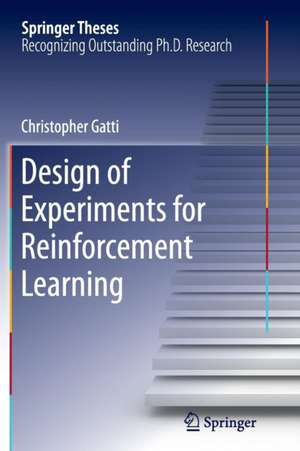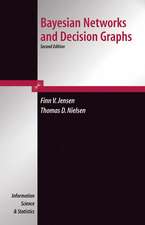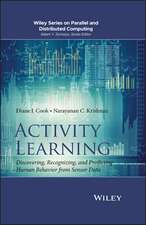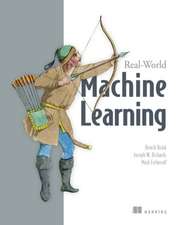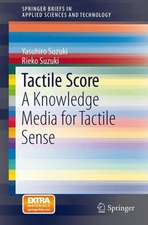Design of Experiments for Reinforcement Learning: Springer Theses
Autor Christopher Gattien Limba Engleză Paperback – 22 sep 2016
| Toate formatele și edițiile | Preț | Express |
|---|---|---|
| Paperback (1) | 641.16 lei 6-8 săpt. | |
| Springer International Publishing – 22 sep 2016 | 641.16 lei 6-8 săpt. | |
| Hardback (1) | 647.28 lei 6-8 săpt. | |
| Springer International Publishing – 8 dec 2014 | 647.28 lei 6-8 săpt. |
Din seria Springer Theses
- 18%
 Preț: 997.88 lei
Preț: 997.88 lei -
 Preț: 389.88 lei
Preț: 389.88 lei - 15%
 Preț: 646.94 lei
Preț: 646.94 lei - 18%
 Preț: 943.43 lei
Preț: 943.43 lei -
 Preț: 399.29 lei
Preț: 399.29 lei - 18%
 Preț: 944.99 lei
Preț: 944.99 lei - 15%
 Preț: 636.80 lei
Preț: 636.80 lei - 18%
 Preț: 941.05 lei
Preț: 941.05 lei - 15%
 Preț: 643.16 lei
Preț: 643.16 lei - 15%
 Preț: 642.68 lei
Preț: 642.68 lei - 18%
 Preț: 1103.62 lei
Preț: 1103.62 lei - 20%
 Preț: 558.83 lei
Preț: 558.83 lei - 18%
 Preț: 1112.30 lei
Preț: 1112.30 lei - 18%
 Preț: 944.19 lei
Preț: 944.19 lei - 18%
 Preț: 1109.92 lei
Preț: 1109.92 lei - 18%
 Preț: 1217.27 lei
Preț: 1217.27 lei - 15%
 Preț: 640.06 lei
Preț: 640.06 lei - 15%
 Preț: 636.45 lei
Preț: 636.45 lei - 15%
 Preț: 640.06 lei
Preț: 640.06 lei - 15%
 Preț: 640.88 lei
Preț: 640.88 lei -
 Preț: 389.70 lei
Preț: 389.70 lei - 20%
 Preț: 563.91 lei
Preț: 563.91 lei -
 Preț: 393.35 lei
Preț: 393.35 lei - 15%
 Preț: 637.93 lei
Preț: 637.93 lei - 15%
 Preț: 641.85 lei
Preț: 641.85 lei - 18%
 Preț: 1225.94 lei
Preț: 1225.94 lei - 20%
 Preț: 551.36 lei
Preț: 551.36 lei - 18%
 Preț: 1229.10 lei
Preț: 1229.10 lei - 15%
 Preț: 639.25 lei
Preț: 639.25 lei - 18%
 Preț: 999.45 lei
Preț: 999.45 lei - 15%
 Preț: 640.06 lei
Preț: 640.06 lei - 18%
 Preț: 1220.45 lei
Preț: 1220.45 lei - 18%
 Preț: 1116.26 lei
Preț: 1116.26 lei - 18%
 Preț: 1110.72 lei
Preț: 1110.72 lei - 18%
 Preț: 1000.87 lei
Preț: 1000.87 lei - 18%
 Preț: 891.17 lei
Preț: 891.17 lei - 15%
 Preț: 640.06 lei
Preț: 640.06 lei - 5%
 Preț: 1154.07 lei
Preț: 1154.07 lei - 15%
 Preț: 635.96 lei
Preț: 635.96 lei - 15%
 Preț: 640.88 lei
Preț: 640.88 lei -
 Preț: 387.20 lei
Preț: 387.20 lei - 18%
 Preț: 1109.92 lei
Preț: 1109.92 lei -
 Preț: 385.25 lei
Preț: 385.25 lei -
 Preț: 385.25 lei
Preț: 385.25 lei - 18%
 Preț: 1112.30 lei
Preț: 1112.30 lei - 18%
 Preț: 999.45 lei
Preț: 999.45 lei -
 Preț: 386.99 lei
Preț: 386.99 lei - 15%
 Preț: 637.13 lei
Preț: 637.13 lei - 20%
 Preț: 554.21 lei
Preț: 554.21 lei - 20%
 Preț: 555.59 lei
Preț: 555.59 lei
Preț: 641.16 lei
Preț vechi: 801.45 lei
-20% Nou
Puncte Express: 962
Preț estimativ în valută:
122.69€ • 133.68$ • 103.38£
122.69€ • 133.68$ • 103.38£
Carte tipărită la comandă
Livrare economică 23 aprilie-07 mai
Preluare comenzi: 021 569.72.76
Specificații
ISBN-13: 9783319385518
ISBN-10: 3319385518
Pagini: 204
Ilustrații: XIII, 191 p. 46 illus., 25 illus. in color.
Dimensiuni: 155 x 235 x 11 mm
Greutate: 0.3 kg
Ediția:Softcover reprint of the original 1st ed. 2015
Editura: Springer International Publishing
Colecția Springer
Seria Springer Theses
Locul publicării:Cham, Switzerland
ISBN-10: 3319385518
Pagini: 204
Ilustrații: XIII, 191 p. 46 illus., 25 illus. in color.
Dimensiuni: 155 x 235 x 11 mm
Greutate: 0.3 kg
Ediția:Softcover reprint of the original 1st ed. 2015
Editura: Springer International Publishing
Colecția Springer
Seria Springer Theses
Locul publicării:Cham, Switzerland
Cuprins
Introduction.- Reinforcement Learning. Design of Experiments.- Methodology.- The Mountain Car Problem.- The Truck Backer-Upper Problem.- The Tandem Truck Backer-Upper Problem.- Appendices.
Notă biografică
Christopher Gatti received his PhD in Decision Sciences and Engineering Systems from Rensselaer Polytechnic Institute (RPI). During his time at RPI, his work focused on machine learning and statistics, with applications in reinforcement learning, graph search, stem cell RNA analysis, and neuro-electrophysiological signal analysis. Prior to beginning his graduate work at RPI, he received a BSE in mechanical engineering and an MSE in biomedical engineering, both from the University of Michigan. He then continued to work at the University of Michigan for three years doing computational biomechanics focusing on the shoulder and knee. He has been a gymnast since he was a child and is currently an acrobat for Cirque du Soleil.
Caracteristici
Nominated by the Rensselaer Polytechnic Institute as an outstanding Ph.D. thesis Explains reinforcement learning through a range of problems by exploring what affects reinforcement learning and what contributes to a successful implementation Includes a contemporary design of experiments methods, comprising of a novel sequential experimentation procedure that finds convergent learning algorithm parameter subregions and stochastic kriging for response surface metamodeling Includes supplementary material: sn.pub/extras
